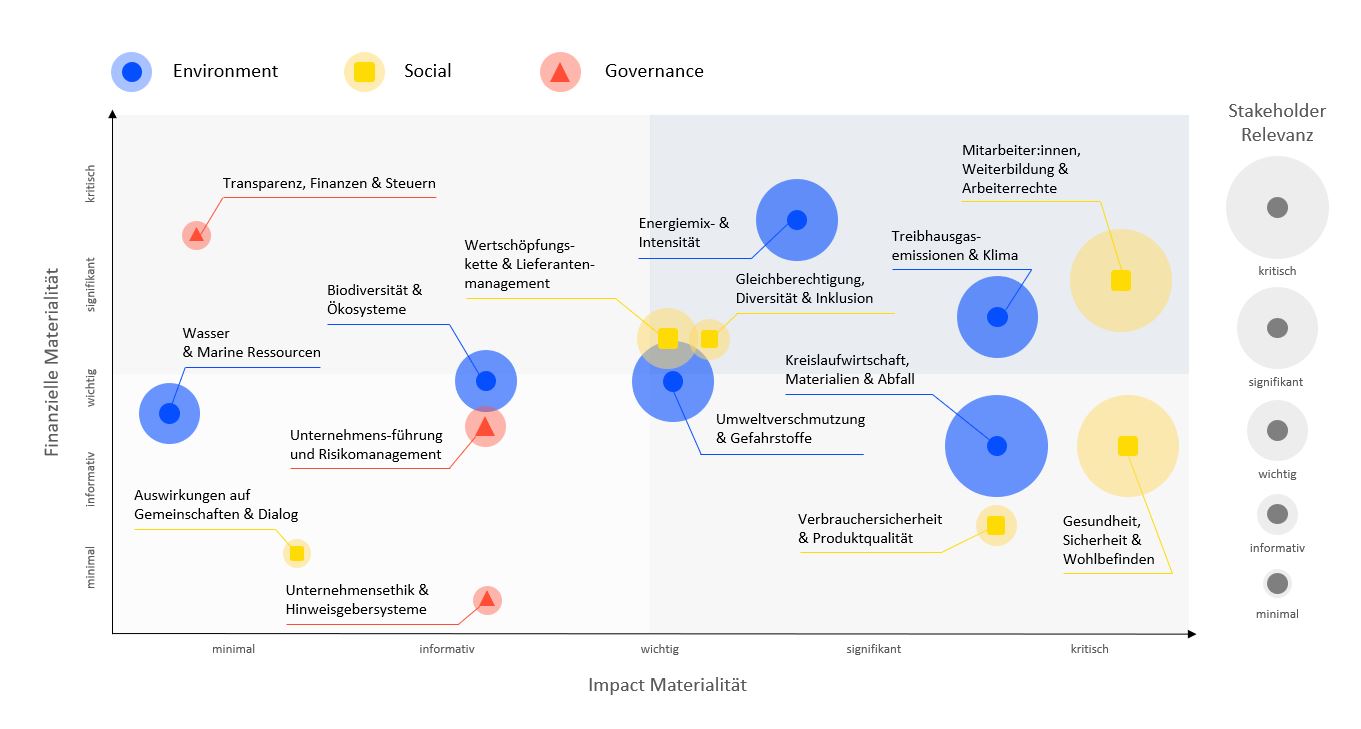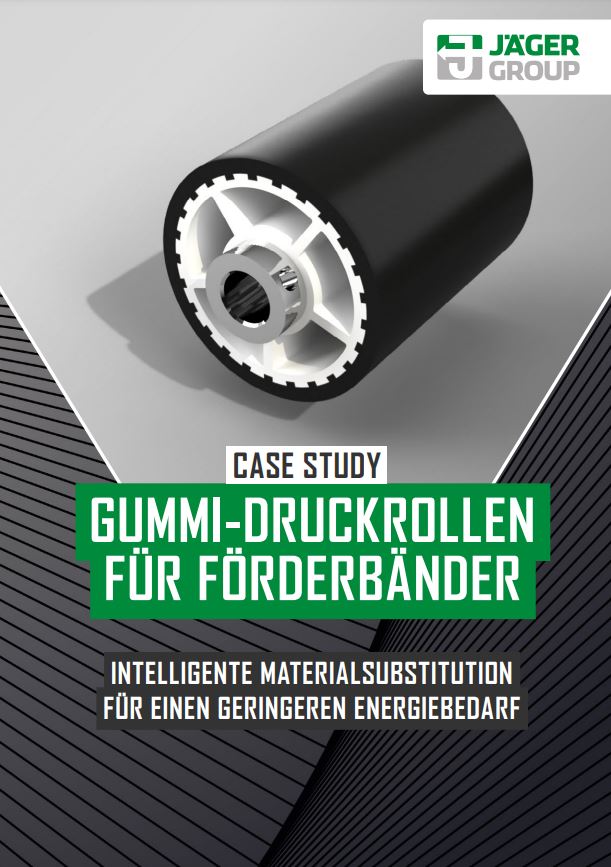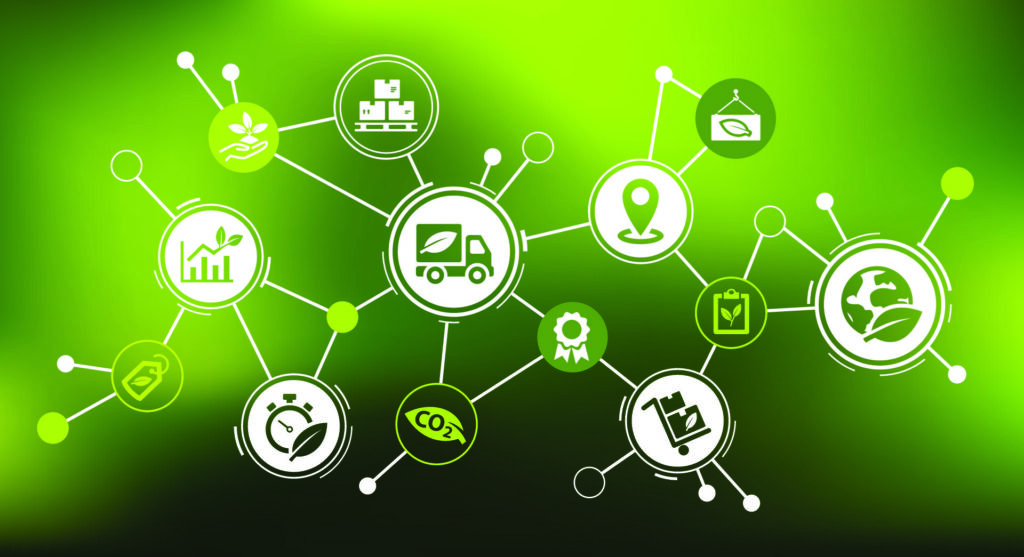Sustainability policy statement
Our global business activities are based on respect for universal human rights, freedom of religion, and the economical use of energy and raw materials. We comply with all applicable national and international laws and regulations,
provide a safe and healthy working environment for our employees, and ensure that no psychological or physical violence is used in our operations. Any form of discrimination, and in particular child labour, is strictly prohibited. To protect our credibility and independence, we do not accept gifts or other benefits from our business partners.
We strive to minimize the impact of our production and service processes on the environment, ensuring sustainable management.
The mission statement basically sets out a general code of conduct for how we behave with regard to sustainability. In order to obtain a concrete statement about the sustainability areas in which our behavior has an impact, a so-called double materiality analysis was carried out in 2022 in accordance with the European Sustainability Reporting Standard (ESRS). It consists of two perspectives: Inside-Out perspective and Outside-In perspective.
The inside-out perspective refers to the perspective of the company itself. This involves internal stakeholders, such as employees, management and shareholders, in order to find out which sustainability aspects are most relevant to the company. The company looks at its own activities, risks and opportunities to determine which issues may impact its long-term performance and relationships with stakeholders.
The outside-in perspective, on the other hand, refers to the perspective of identified stakeholders, such as suppliers and customers. The company collects information about the expectations and concerns of these stakeholders with regard to sustainability and takes these into account when identifying material topics.
The result is presented as a materiality matrix and serves as a basis for identifying the most important fields of action.

The JÄGER Group has carried out its 2022 materiality analysis. These aspects are presented visually in the materiality matrix to illustrate the relevance and priority of the various sustainability topics. The X-axis represents the impact of an issue on the company, while the Y-axis represents the financial impact. The Z-axis represents the relevance for stakeholders. Topics in the top right-hand corner of the matrix are of high importance to the company.
Objectives
The Jäger Group is committed to continuously improving energy efficiency in production and gradually switching to renewable energy. This minimises our environmental footprint in terms of energy use. In this way, our ecological footprint in terms of energy use is constantly minimized.
Objectives
The Jäger Group strives to provide optimal working conditions by respecting employees’ work-related rights, promoting regular communication between management and staff, and offering high-quality training opportunities. In turn, employees are able to contribute their full potential to the company.
Objectives
The Jäger Group ensures that any potential negative impacts on employees in the value chain, including its suppliers, resulting from its own business activities are prevented, mitigated or eliminated completely.
We rely on the cooperation with IntegrityNext.
Objectives
Objectives


7. Dezember 2022

25. May 2022
If you want to improve your carbon footprint in the rubber sector, you also have to put your supply chain under the microscope — from plantation to production.
Our annual report on sustainability provides you with a detailed and transparent overview.
You can conveniently download our publications as PDFs here.
Unlawful behavior harms the JÄGER Group. In the fight against unlawful behavior, it is therefore a central interest of JÄGER Group to become aware of this behavior. Your report is an important contribution to clarification and combating. The JÄGER Group does not tolerate retaliation against whistleblowers. In accordance with legal requirements, reports are accepted either in writing via the whistleblower portal or verbally via the hotline (Tel.: +49 511 563 6348).
Arnold Jäger Holding GmbH
Lohweg 1
30559 Hannover (Germany)
Tel. +49 511 – 53580
Fax +49 511 – 553394
Management board:
Dipl.-Kfm. Marius Jäger
Dipl.-Ing. Sebastian Jäger
Florian Körner, MBA
Registercourt Hannover HRB 59983
DE 813 341 233
Arnold Jäger Holding GmbH
Artemis Kautschuk- und Kunststoff-Technik GmbH
Artemis Metall GmbH & Co. KG
Artemis PC Pump Systems Ltd.
Transportbandenfabriek EA Broekema B.V.
Broekema Beltway USA, Inc.
Jaeger Envirotech India Private Limited
Jäger Gummi und Kunststoff GmbH
Jaeger Maritime Solutions GmbH
Jaeger Polska Sp. z o.o.
Jaeger Precision Elastomers GmbH
Jaeger Rubber & Plastics (Shenzhen) Ltd.
Jaeger EnviroTech GmbH
Jaeger-Unitek Sealing Solutions, Inc.
Spira Systems, Ltd.
Windgassen GmbH